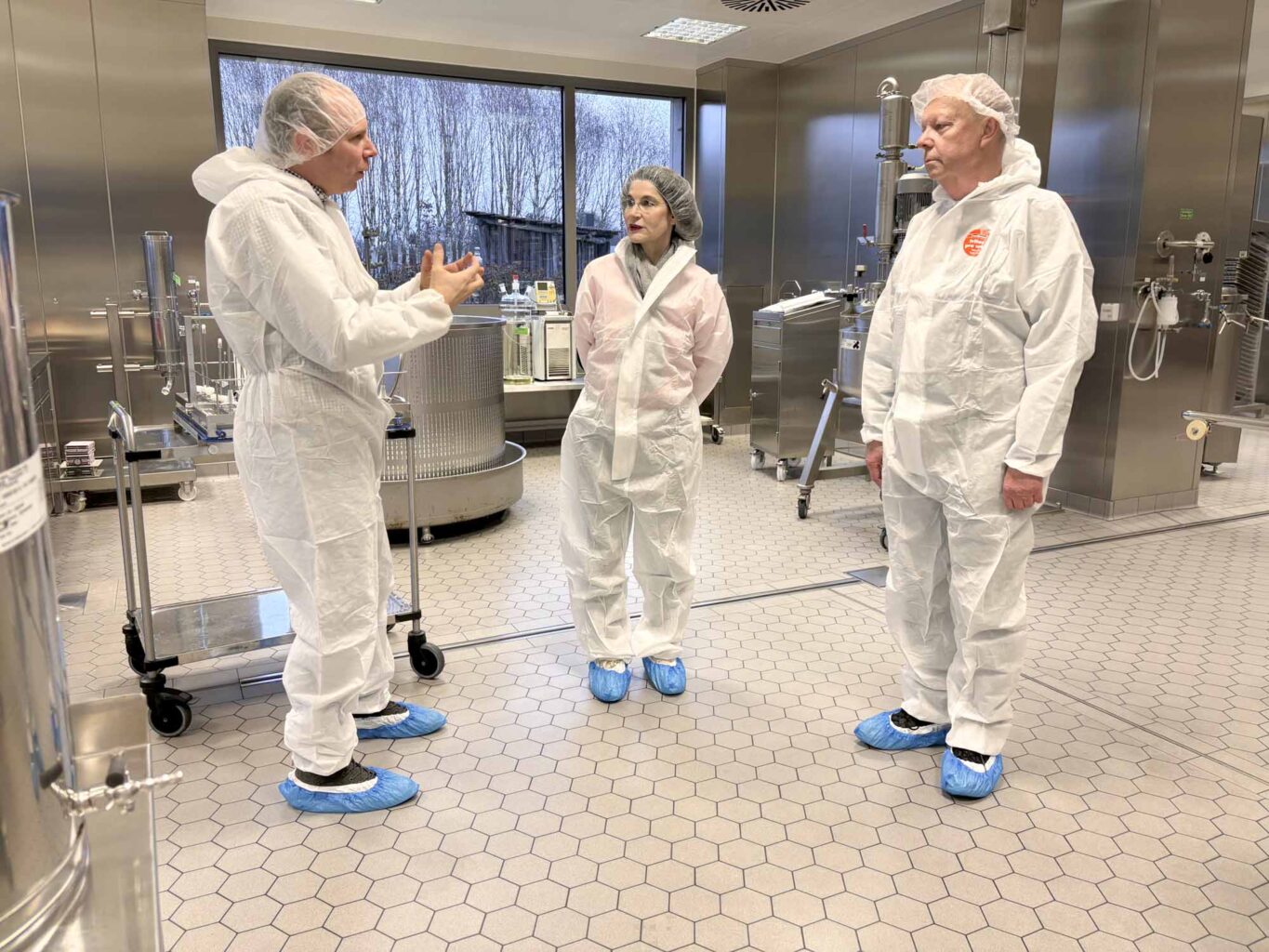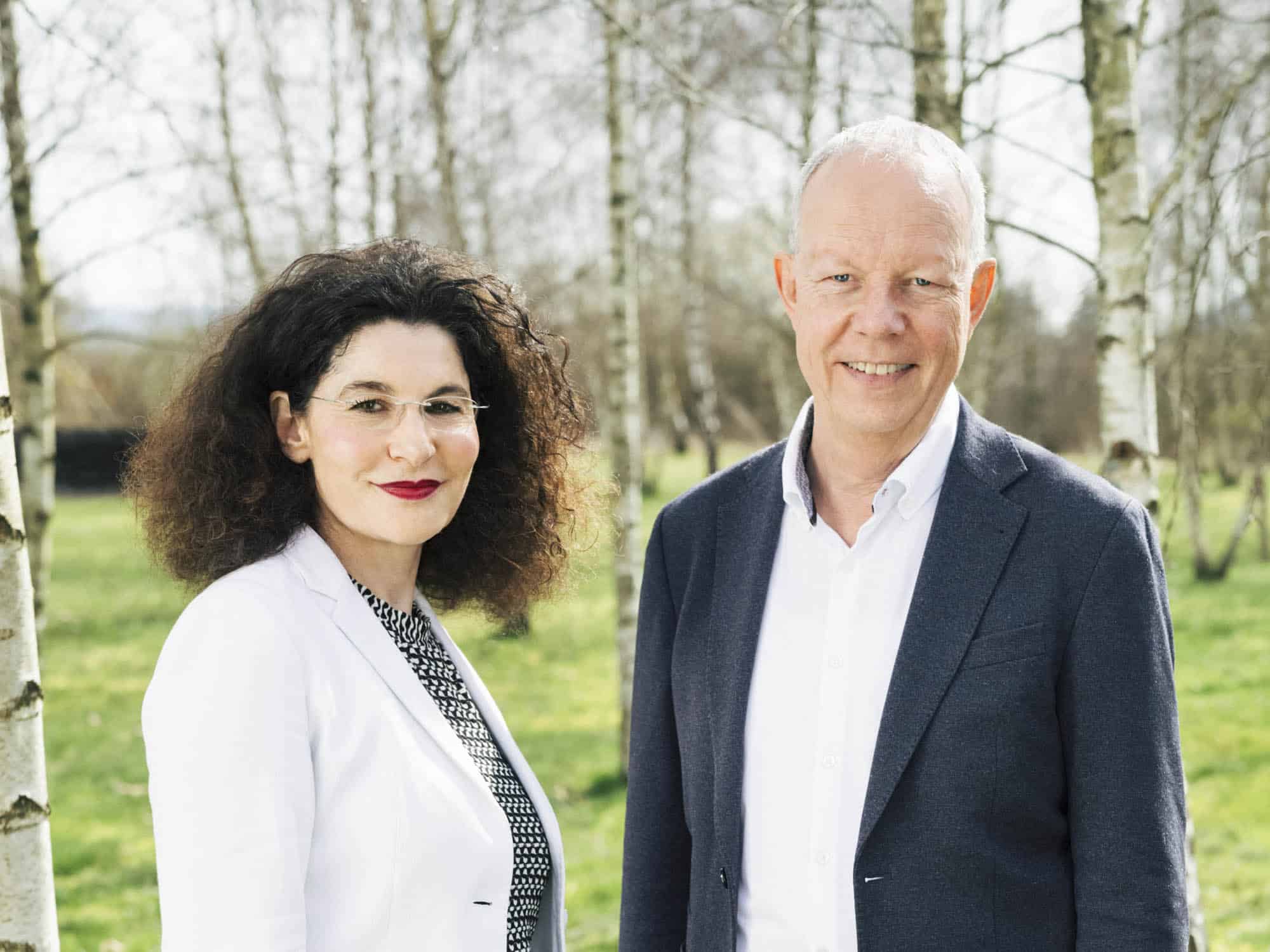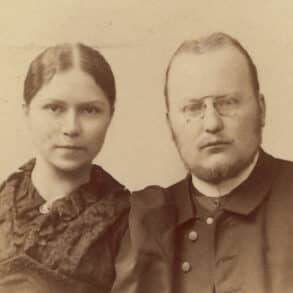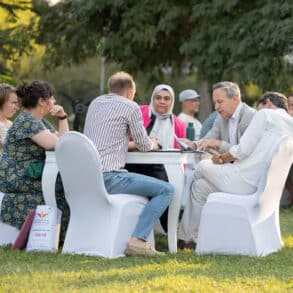Tina Müller has been the CEO of Weleda AG since October 2023. Below is an interview with her and Thomas Jorberg, the Chairman of the company’s Board of Directors, with questions by Wolfgang Held.
Wolfgang Held: In light of Weleda’s positive financial statements for 2023, it would be worthwhile to give a sketch of the dramatic developments over the last three years. How did the crisis come about?
Thomas Jorberg The war in Ukraine and the pandemic led to inflation and higher energy costs, and, at the same time, due to changes in legislation, we were no longer able to run manufacturing in France. We also had enormous investment costs while building our new central logistics centre. All these things together created a crisis for us and led to a loss in 2022. So, at the end of 2022, we began a savings program, which we increased last year. We cut costs wherever we could but also had to decrease our workforce and let some employees go. That was the most urgent step. After that, the solutions we came up with to address the structural problems that got us into such a difficult situation in the first place were more sustainable. We set a new course. It was essential that we separated Weleda’s two divisions, Cosmetics and Pharmaceuticals, more strongly. In the future, both are to be managed as business units from an entrepreneurial perspective. We have now implemented this and see good opportunities for development in both areas since there’s great demand for natural cosmetics and natural remedies in the markets. We will not be able to continue into the future with savings alone. Rather, we need to better serve this increasing demand through higher sales of our high-quality products, which we are continuing to develop.
Are you using the crisis to make Weleda more stable?
Jorberg A crisis does not come about by chance and does not only have external causes—it also connects with the question: how resilient is the enterprise itself? What we have learned from this crisis is that we must position Weleda in such a way that we become more resilient overall in order to be able to cope with these kinds of fluctuations in sales, this volatility, which is certainly present in the markets today and is part of the development of society.
Is continuing to reduce the range of medicines no longer a key issue?
Jorberg One can’t run a successful business by always focusing on the question, “What can we let go of in order to make things better for ourselves?” That’s not motivating for anyone. We have turned this around and are no longer discussing product range reductions but are instead looking at which of our great medicaments have the potential to find customers far beyond the anthroposophical sector. Where are there health needs that we can serve with our medicaments? We have great products—such as Amara for digestion, Euphrasia for the eyes, Infludo for colds, Bryophyllum in the field of gynaecology, etc.—which we see great potential for if we market them in such a way that we reach not only the anthroposophical niche but also the general public.
Tina Müller, you took on the leadership of Weleda AG as the CEO last October. You came from Douglas GmbH, the Germany-based multinational perfumery and cosmetics chain. How was it to make Weleda your next step?
Tina Müller I said at the time, “This is the ‘natural’ next step.” I remain loyal to the industry, and, on the other hand, I find it new and interesting to run an enterprise that has a very clear sense of purpose in its founding impulse. As I’m sure you know, there’s hardly a trendier word in business at the moment than “purpose.” So, people try to formulate a purpose retrospectively. Weleda is completely different. This enterprise was founded more than a hundred years ago with a clear purpose. This is part of its DNA and naturally makes it so meaningful and credible—a priceless value! There is an opportunity here to not only apply what I have learned professionally through decades of experience, but this path forward also includes a responsibility for further growth. It’s not growth at the expense of human beings, at the expense of nature, at the expense of animals, but rather growth in harmony with nature and human beings. That far surpasses almost all other enterprises in simply what makes clear sense. That was the incentive for me. The second reason came when I was given a guided tour of the [Weleda] medicinal plant garden in Schwäbisch Gmünd, Germany [near Stuttgart]. This is where my inner decision was made. The way the plants are grown there—biodynamically—the plant quality that the gardeners achieve there is unique. I have already worked with so many products and therefore know that the quality of Weleda’s products towers over the market. This is something that is non-negotiable: product quality. And you rarely have that today. Most large cosmetics companies tweak the manufacturing costs of a shower gel as much as possible to increase the margin until, ultimately, the quality falls by the wayside. At Weleda, quality and the customer are the focus.
Now, you’ve been on your way for six months. Was the garden right?
Müller Yes. With our new growth strategy #Focus_GrowthThatMatters, we have identified four areas in which we say we can grow sustainably and responsibly. One is innovation. Now, I’m talking primarily about the cosmetics market. This is characterised by innovation, by relevant new products. There is still potential here for Weleda to better serve one or two categories in the market. This is especially true for facial care. Weleda has more of a body care background. The facial care segment is growing enormously! We are an ageing population whose needs include facial care in the maintenance of youthful skin. We are now serving this segment much more actively and this offers great potential for growth. Innovation is the at top of our growth agenda. Then, there’s internationalisation. Weleda has huge opportunities worldwide. We are currently experiencing double-digit growth in the USA, Eastern Europe, Scandinavia, and Italy, for example. It’s also about digitalisation, in the sense of e-commerce, more online purchases, and our own online shop. Weleda Switzerland launched its online shop last year, in Germany only this year. That was late! Weleda can benefit greatly from this shift from offline purchases to online purchases. The fourth area concerns “premiumisation.” Today, Weleda is mainly found in drugstores and next in pharmacies. The big wide field of cosmetic shops is still waiting for Weleda. We still have little presence there. But you can’t just put the Weleda Wild Rose moisturiser in the cosmetic shop because the beauty shop requires products that differentiate themselves. That’s why we’ve launched a major new project to develop a Weleda line specifically aimed at the cosmetic shop channel.
With higher quality and appearance?
Müller With greater value and a focus on facial care. This goes hand in hand with the modernisation of the entire Weleda brand. There is a saying: “Brands that don’t go with the times, go with the times.” That’s why it’s always worth making sure you keep a brand up to date.
Does this also affect the strategy of rejuvenating the brands?
Müller We’ve seen that our main clientele today is fifty years and older and that we’re not addressing young people between the ages of fifteen and forty enough. This led us to focus more now on appealing to younger target groups. This is done with digital media via social media channels. Influencers play a role here; we have great potential at Weleda to make this more professional and to demonstrate a stronger digital presence. This also means recruiting expertise into the company. We are strengthening this area.
Now, let me say something about the pharmaceutical sector; Thomas Jorberg has already mentioned it. Clearly, we can also cut costs, reduce complexity, and become more efficient. Ultimately, though, we have to develop a growth strategy here, too. The product range is, indeed, very extensive. Some products stand out from this abundance. So, then we go forward and decide that we will market individual medicines in the same way that we market cosmetic products, including through digital channels. We’re now starting to develop the first campaigns. We can’t afford to go into television advertising at the moment. The profitability of the business does not allow for this yet. But we can take the first steps to see how it works. A few products have already been mentioned that are so excellent that we should and want to make them more widely accessible.
Are you referring to the eye drops, Visiodoron?
Müller Yes, or Amara for the stomach. Irritable bowel syndrome is currently a major issue. This market is growing since more and more people seem to be having problems with their stomachs and intestines.
Marketing means knowing and fulfilling needs, yes?
Müller Yes, that’s right. Marketing means creating a relevant and differentiated offering. Relevance is important because it means fulfilling a customer’s need. But relevance alone is not enough today; the product must also differentiate itself from the rest of the market because otherwise, one has no reason to switch. If I were to offer you something that you already have from another brand and it doesn’t differentiate itself, if there’s nothing new behind it, then you would ask, “Why should I switch?” So, one has to work out how the product differentiates itself, how it makes itself unique and stands out when compared with others.
That requires getting to know people, getting closer to them?
Müller It means being very close to people, to their needs, and also to their wishes.
Jorberg What a brand is, fundamentally, actually takes on a life within the person. A brand is the experience that the customer has. Ultimately, that is the brand; that is what makes the brand strong. In this respect, one has to communicate so that this experience becomes an expectation, but then also an expectation that will be fulfilled for the customer.
Müller Yes, the brand is a leap of faith. When a new product is launched under Weleda, the competence of our brand streams out directly onto this new product. People have confidence in the brand; they have had positive experiences. So, the brand is the anchor, the anchor of trust.

I would like to present you with a few explanations of what, in my formulation, anthroposophy is or what it promises.
Müller I’m interested to hear that.
Anthroposophy combines science and art in order to take spiritual responsibility.
Müller What interests me about anthroposophy is that it is a holistic approach. It’s not just about the body, but also about the soul and the spirit, and science and art are certainly needed to grasp these three. Everyone realises today that a purely physical view is not enough. Whether Ayurveda, TCM [Traditional Chinese Medicine], or Anthroposophic Medicine, these spiritual or holistic concepts are really very modern. Many causes of illness have components that relate to the soul. Healthy mental functioning also plays a major role. Mental health is one of the most talked about concepts today. That is, indeed, why I find this holistic approach of anthroposophy so modern, and I believe that it would be important to communicate this idea even better and help raise it to an even more understandable level. And now I’m probably making myself unpopular with your readers.
Hardly, because expressing spirituality in an understandable way becomes a question of life in anthroposophy. Here’s another description: Anthroposophy inspires us to find the inner side of everything.
Müller Yes, but I don’t just think about the inside, but also the outside. We always consist of inside and outside, and, naturally, I also take care of the outside with cosmetics.
Anthroposophy is a tool to explore the question, “How does something become ‘human’”?
Müller Yes, that’s true. I also see it like that! But we can also relate this to the topic of leadership. It is certainly appreciative, respectful leadership that makes work human. And I think that also makes it holistic. And that is an aspect of anthroposophy that can be applied very well to corporate management.
Anthroposophy is an instrument for combining outer and inner growth.
Müller I think that’s absolutely right. I would like to go back to body, soul, and spirit. They belong together, and only when they are unified and in balance can anything good come of it. This probably applies to personal life as well as to entrepreneurial life and entrepreneurial activity. A company is also a social fabric; it’s a community where people have experiences, where they learn, where they live, and where the inner and the outer exist at the same time. In my conception, this holistic approach is also the most modern form of leadership.
At Weleda, there are two pillars: beauty and health. How are they connected?
Müller I think that health and beauty are very close-knit today. Everyone knows that if you eat healthily and are healthy, this is reflected in your appearance. This becomes outer beauty. Reciprocally, outer beauty can have an effect on our psyche. When I look in the mirror and look good because I have good cosmetics and take good care of myself, this can have an extremely positive effect on my mood, my attitude to life, and my self-confidence.
I think it’s helpful for people to take a deeper look at the concept of beauty. There is no outer beauty without inner beauty. You can try as hard as you like to beautify yourself on the outside; if you are not happy on the inside, your outer beauty will not shine. At Weleda, both sides come together: We have medicines that keep us healthy or have a regulating effect, and we have the corresponding natural cosmetic products to go with them. This gives us a holistic concept of health and beauty in a very natural way.
Weleda’s ideal of beauty is the ideal of natural beauty. It’s not about changing oneself artificially. Our ideal of beauty respects one’s natural being and optimises one’s beauty, attractiveness, and youthfulness. There’s a difference here as compared with the generation of our parents and grandparents in that we feel much younger and fitter today. We also want to adapt our look to how we feel. This is, for me, also a reason why the cosmetics industry is booming. People want to close this gap. Naturally, one could say that this is too much self-optimisation. But, when self-optimisation leads to satisfaction and happiness, then it’s good. When we can help people feel healthy and happy with our medicines and beauty products, then we are indeed doing something good and improving the lives of human beings.
May I ask you a personal question: What book is currently on your desk?
Müller Alles überall auf einmal [Everything everywhere at once], a book about artificial intelligence.1
And you, Mr. Jorberg?
Jorberg At the moment, I have Wolfgang Schäuble’s2 biography on my bedside table. Biographies are my favourite genre.
What part of the business makes your stomach ache?
Müller What gives me pause for thought is that Weleda has a strong culture. New talents are coming into the company who, like me, had nothing to do with anthroposophical thinking beforehand. A “melting pot” of cultures is now forming, in which different corporate cultures come together and have to be integrated with one another. For the Weleda culture, this means opening up and welcoming others. Both sides have to approach each other. This is a process that is now taking place, and it is still sometimes a bit stuck. But it is an important process, and I hope that it will lead us to the next level of cultural development. Not that our values will change, but they will be provided with new inspiration, new energy, and new forces.
Mrs. Müller, what are you particularly looking forward to with regard to Weleda this year?
Müller So, I’m really looking forward to the moment when we open our new logistics centre. It is built from wood and clay and is probably the most sustainable logistics centre in the whole of Europe. This is Weleda’s biggest investment and an absolute highlight. And I’m honestly delighted every day to see how innovative, creative, and productive the teams are at the moment in creating something new, creating visual worlds for the brand. At the moment, I think we have a spirit of optimism, an entrepreneurial spirit in the company, which will probably show its results in the coming years. A lot is being created at the moment. I see that with great joy.
Translation Joshua Kelberman
Title image Tina Müller and Thomas Jorberg. Photo: Weleda AG
Footnotes
- Miriam Meckel and Léa Steinacker, Alles überall auf einmal: Wie Künstliche Intelligenz unsere Welt verändert und was wir dabei gewinnen können: [Everything everywhere at once: How Artificial Intelligence is changing our world and what we can gain from it] (Hamburg: Rowohlt, 2024).
- Wolfgang Schäuble (1942–2023) was the longest-serving parliamentarian in German history and is best known for his decisive role in reunification following the fall of the Berlin Wall as well as developing measures in the wake of the global financial crash of 2008. He was one of the most popular politicians in Germany and was a possible future chancellor.









